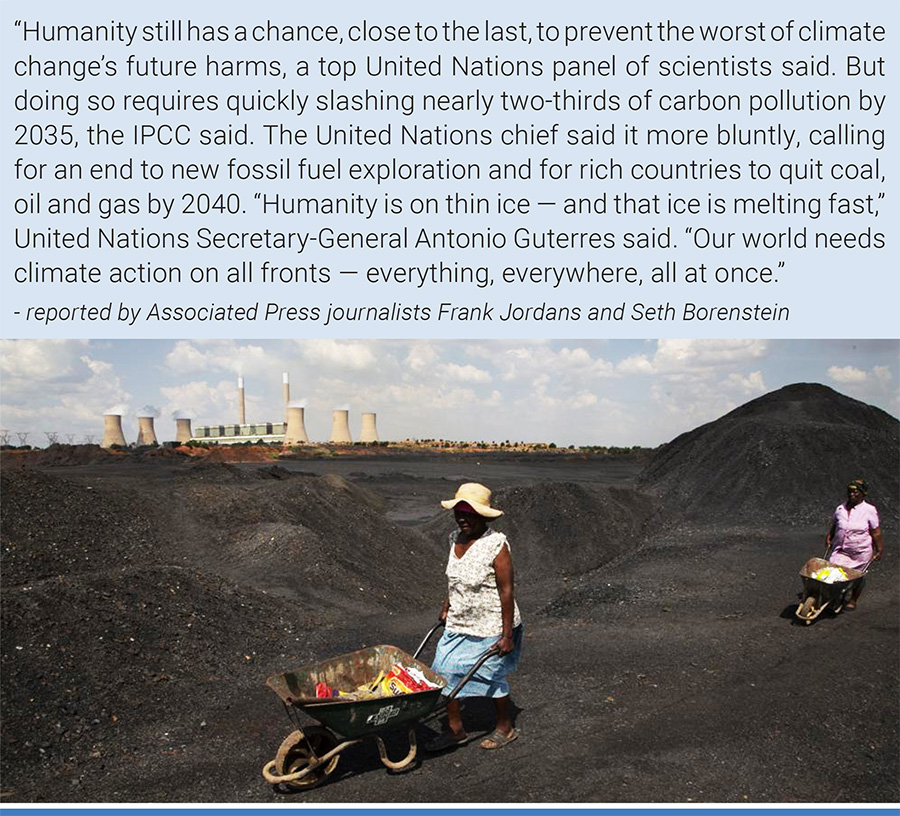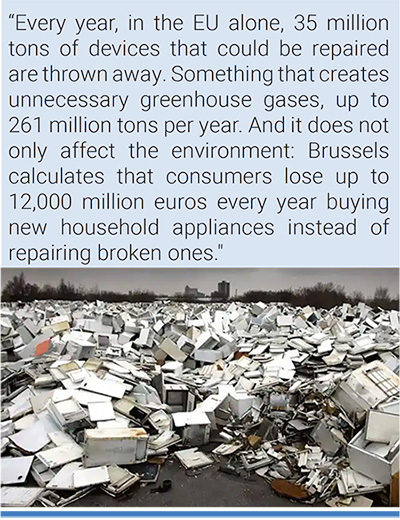Monthly Summaries
Issue 75, March 2023
[DOI]
 Pakistani women wade through floodwaters as they take refuge in Shikarpur district of Sindh Province, of Pakistan. Photo: Fareed Khan/AP.
Pakistani women wade through floodwaters as they take refuge in Shikarpur district of Sindh Province, of Pakistan. Photo: Fareed Khan/AP.
March media coverage of climate change or global warming in newspapers around the globe increased 21% from February 2023 and was also 14% higher than March 2022 levels. International wire services increased 22% while radio coverage similarly went up 26% from February 2023. Compared to the previous month, coverage increased in Asia (12%), Oceania (15%), Latin America (17%), North America (24%), the European Union (EU) (33%), Africa (34%), and the Middle East (106%). Figure 1 shows trends in newspaper media coverage at the global scale – organized into seven geographical regions around the world – from January 2004 through March 2023.

Figure 1. Newspaper media coverage of climate change or global warming in print sources in seven different regions around the world, from January 2004 through March 2023.
Among countries that we at the Media and Climate Change Observatory (MeCCO) monitor, United States (US) print coverage increased 14% while television coverage increased 57% from February.

Figure 2. Newspaper coverage of climate change or global warming in Australia newspapers Sydney Morning Herald, Courier Mail & Sunday Mail, The Australian, Daily Telegraph & Sunday Telegraph, and The Age from January 2000 through March 2023.
Turning to the content of coverage, media attention to climate change or global warming was pervaded by ecological and meteorological themes. For instance, heavy rains and flooding in the US west – with links made to climate change – generated substantial media coverage. For example, CNN journalist Rachel Ramirez reported, “California is bracing for yet another powerful, atmospheric river storm this week, continuing the onslaught of major weather whiplash after a year’s long, historic megadrought. Many welcomed this winter’s heavy rain and snow since it was so desperately needed to replenish the state’s severely drained reservoirs and depleted groundwater. But the storms kept coming. California is now facing its 12th significant atmospheric river since the parade of strong storms began in late December… It’s unclear how the climate crisis could be playing a role in the number of storms that hit the West Coast. But climate scientists have linked the climate crisis to an increase in the amount of moisture the atmosphere holds, meaning storms — such as hurricanes and atmospheric rivers that are impacting the West Coast now — will be able to bring more moisture inland than it would without climate change, which in turn leads to an increase in rainfall rates and flash flooding”.
Moreover, political and economic-themed media stories about climate change or global warming continued to unfold in March. Among these stories, actions by the country of Vanuatu grabbed media headlines and stories. For example, Washington Post correspondent Michael Birnbaum wrote, “The small Pacific island nation of Vanuatu won a major victory to advance international climate law Wednesday after it persuaded the U.N. General Assembly to ask the world’s highest international court to rule on the obligations of countries to address climate change. The request for an advisory ruling from the International Court of Justice is expected to clarify the legal obligations of countries to address climate change — and to create a path for them to be sued if they fail to do so. The U.N. effort was a significant outcome for Vanuatu, an archipelago nation of 320,000 people that is suffering from climate-change-driven natural disasters. In recent weeks, it was hit by two Category 4 cyclones, the severity of which its leaders blamed on global warming. Thousands of people are still living in shelters. The country has used its moral authority and ability to stage action at the United Nations to achieve outsize results on climate issues. The U.N. General Assembly approved the measure by acclamation, with neither the United States nor China standing in the way of the effort despite uncertainty in advance whether they would seek a formal up-or-down vote”.
A fridge dump in Manchester. Almost two-thirds of global e-waste was made up of discarded kitchen and laundry devices. Photo: Phil Noble/AP. |
In March, the European Union took several political actions that garnered media attention. For example, El País journalist Silvia Ayuso wrote, “According to data from the European Commission, more than half of the ecological claims made by companies and products, from clothes to detergents to food, are "vague, misleading or unsubstantiated". Up to 40% even lack a basis to be sold as environmentally friendly products." On the other hand, he deepened the initiative of the “right of reparation”. "Every year, in the EU alone, 35 million tons of devices that could be repaired are thrown away. Something that creates unnecessary greenhouse gases, up to 261 million tons per year. And it does not only affect the environment: Brussels calculates that consumers lose up to 12,000 million euros every year buying new household appliances instead of repairing broken ones".
Also in March, news circulated when a gathering of foreign ministers, heads of state and government of the 22 countries of the Ibero-American Community of Nations held the XXVIII meeting in the Dominican Republic. For example, El País journalists Francesco Manetto y Miguel González noted that “the summit was convened under the slogan "Together for a just and sustainable Ibero-America". The meeting addressed "four agreements on climate change, food security, digital divide and a proposal on credits and international financial architecture". It is the first time that it prioritizes environmental challenges. The Ibero-American Environmental Charter is an important document of common commitment of the countries to address the challenges of climate change, the loss of biodiversity, pollution, deforestation, desertification, the loss of glaciers, drought, the degradation of soils, the scarcity of water resources and the pollution of the oceans, as well as the increased risk of disasters”.

Figure 3. Newspaper front page stories in March covering the release of the United Nations Intergovernmental Panel on Climate Change Synthesis Report.
Various cultural stories relating to climate change or global warming were also evident in wider news coverage in March. To illustrate, Guardian journalist Katharine Gammon reported on how comedy is being harnessed to communicate about climate change. She wrote, “Climate change has increasingly featured in television dramas and apocalyptic thrillers. But comedians like Perdue, as well as higher-profile acts like Michelle Wolf and Joel Kim Booster, are also taking on the climate crisis…By talking about climate, even irreverently, social scientists say, they may be helping to combat climate doom and boost civic engagement”.

Women push wheelbarrows atop a coal mine dump at the coal-powered Duvha power station, near Emalahleni east of Johannesburg. Photo: Denis Farrell/AP.
Finally, many scientific themes continued to emerge in media stories during the month of March through new studies, reports, and assessments. Prominently, the release of the United Nations Intergovernmental Panel on Climate Change Synthesis Report generated significant media coverage. For example, Associated Press journalists Frank Jordans and Seth Borenstein reported, “Humanity still has a chance, close to the last, to prevent the worst of climate change’s future harms, a top United Nations panel of scientists said Monday. But doing so requires quickly slashing nearly two-thirds of carbon pollution by 2035, the Intergovernmental Panel on Climate Change said. The United Nations chief said it more bluntly, calling for an end to new fossil fuel exploration and for rich countries to quit coal, oil and gas by 2040. “Humanity is on thin ice — and that ice is melting fast,” United Nations Secretary-General Antonio Guterres said. “Our world needs climate action on all fronts — everything, everywhere, all at once.” Stepping up his pleas for action on fossil fuels, Guterres called for rich countries to accelerate their target for achieving net zero emissions to as early as 2040, and developing nations to aim for 2050 — about a decade earlier than most current targets. He also called for them to stop using coal by 2030 and 2040, respectively, and ensure carbon-free electricity generation in the developed world by 2035, meaning no gas-fired power plants either”.
Thanks for your interest in our Media and Climate Change Observatory (MeCCO) work monitoring media coverage of these intersecting dimensions and themes associated with climate change and global warming.
- report prepared by Max Boykoff, Presley Church, Rogelio Fernández-Reyes, Jennifer Katzung, Ami Nacu-Schmidt and Olivia Pearman


